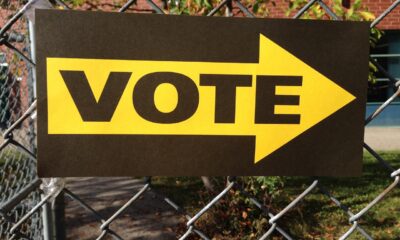Judicial
Kari Lake gets another shot
The Arizona Supreme Court sent the Kari Lake election challenge back to the trial court with orders to consider signature verification.
Kari Lake, who nominally lost the governor’s race in Arizona last Midterms, got another shot this week. For the first time, a higher court has said a lower court wrongly decided an issue with her election challenge. This represents a real chance of forcing a rerun of the election – especially because she “lost” so narrowly.
Kari Lake raised ten issues
In her initial election challenge, Kari Lake raised ten issues, any one of which could have swayed the election. Judge Peter Thompson of the Maricopa County Superior Court dismissed all but two:
- Misprinted ballots that misaligned in the scanner-tabulators, and
- Manipulation of the rolls of inactive voters.
Lake’s team forced the other side into some embarrassing admissions. Unfortunately, Judge Thompson didn’t find those admissions embarrassing enough. Accordingly, Lake took her case to the Court of Appeal and finally to the Arizona Supreme Court.
By the time her case reached the Arizona Supreme Court, she was pressing only seven of her original issues. The Arizona Supreme Court dismissed most of them. But the one issue the high court allowed, was an old issue Judge Thompson had dismissed very early.
Lake alleged that Maricopa County election officials did not follow procedure on signature verification. Apparently Judge Thompson, in his first order, dismissed this count, saying Lake waited too long to challenge the signature verification procedures themselves. The Arizona Supreme Court said no, Judge Thompson was mistaken. Kari Lake was not saying the signature verification rules were somehow unfair. Rather, she said election officials did not handle signature verification according to those rules.
No, she did not wait too long
At issue in the Court’s ruling is a doctrine called laches – which means “neglect of duty” or “missing an opportunity.” The time to challenge the validity of a rule or law, was before the election took place. But if officials did not obey the rule or law, no candidate could have predicted that in advance.
Issue number six asks, “Did the panel err in dismissing the signature-verification claim on laches[,] mischaracterizing Lake’s claim as a challenge to existing signature verification policies, when Lake in fact alleged that Maricopa failed to follow these policies during the 2022 general election?” In Count Three of her complaint, which alleged a violation of A.R.S. §16-550(A), Petitioner alleged in paragraph 151,
“Upon information and belief, a material number of early ballots cast in the November 8, 2022 general election were transmitted in envelopes containing an affidavit signature that the Maricopa County Recorder or his designee determined did not match the signature in the putative voter’s registration record. The Maricopa County Recorder nevertheless accepted a material number of these early ballots for processing and tabulation.”
Contrary to the ruling of the trial court and the Court of Appeals Opinion, this signature verification challenge is to the application of the policies, not to the policies themselves. Therefore, it was erroneous to dismiss this claim under the doctrine of laches because Lake could not have brought this challenge before the election.
Vacate and remand
Accordingly, the Arizona Supreme Court vacated that part of the Court of Appeals opinion, and remanded the case to Judge Thompson’s court. Now Kari Lake’s team will have a chance to examine those envelopes and their signatures. They can then check them against the voter rolls.\
True enough, this does not grant any further examination of the issues with scanner-tabulators or Ballot On Demand printers. But it does address the signature verification issue, which alone could have skewed the outcome. Furthermore the Court seemed to address burdens of proof. The trial court must:
determine whether the claim that Maricopa County failed to comply with A.R.S. § 16-550(A) fails to state a claim pursuant to Ariz. R. Civ. P. 12(b)(6) for reasons other than laches, or, whether Petitioner can prove her claim as alleged pursuant to A.R.S. § 16-672 and establish that “votes [were] affected ‘in sufficient numbers to alter the outcome of the election’” based on a “competent mathematical basis to conclude that the outcome would plausibly have been different, not simply an untethered assertion of uncertainty.” (Opinion ¶ 11.)
A “competent mathematical basis to conclude that the outcome would plausibly have been different” is a far lesser burden than Judge Thompson imposed at trial. He asked Kari Lake to prove beyond a reasonable doubt and to a moral certainty that the outcome was the reverse of what it should have been. Now he must allow a lesser burden, by “competent mathematical” analysis.
How easily can Kari Lake show that?
Kari Lake allegedly lost that election by 17,000 votes State-wide. If, therefore, she finds significantly more than 17,000 absentee ballots with bad signatures, then she has the “competent mathematical basis.”
Ella Ford at Finish the Race has several Twitter tweets that would indicate that the Kari Lake team should be able to find those 17,000 or more ballots easily. Specifically, the influencer “DC Draino” left a shocker of a thread:
If that Gateway Pundit report is accurate, Maricopa County is three hundred thousand ballots out of trust on signatures alone!
A Rasmussen poll asking straight-out for whom Arizonans voted, further suggests that Kari Lake could have that “competent mathematical basis.” WorldNetDaily reports that Lake won that poll, 51 percent to 43 percent. Candidates Abe Hamadeh and Mark Finchem, for Attorney General and Secretary of State respectively, also won this “late exit poll.” Blake Master, the Senate candidate, did not win his “exit poll.” So his results provide an internal control on the other results, and suggest that Arizonans split their ticket. They did not vote straight Republican or straight Democratic. (Arizona’s legislature stayed in Republican hands; that provides an external control.)
Sadly, courts simply don’t like to overturn elections, even if the evidence is palpable and conclusive. Perhaps they don’t want the responsibility. But the Arizona Supreme Court just told a lower court they made an unforced error.
Terry A. Hurlbut has been a student of politics, philosophy, and science for more than 35 years. He is a graduate of Yale College and has served as a physician-level laboratory administrator in a 250-bed community hospital. He also is a serious student of the Bible, is conversant in its two primary original languages, and has followed the creation-science movement closely since 1993.
-

 Accountability2 days ago
Accountability2 days agoWaste of the Day: Principal Bought Lobster with School Funds
-

 Constitution2 days ago
Constitution2 days agoTrump, Canada, and the Constitutional Problem Beneath the Bridge
-

 Executive19 hours ago
Executive19 hours agoHow Relaxed COVID-Era Rules Fueled Minnesota’s Biggest Scam
-

 Civilization18 hours ago
Civilization18 hours agoThe End of Purple States and Competitive Districts
-

 Civilization4 days ago
Civilization4 days agoThe devil is in the details
-

 Civilization3 days ago
Civilization3 days agoThe Conundrum of President Donald J. Trump
-

 Executive4 days ago
Executive4 days agoTwo New Books Bash Covid Failures
-

 Executive4 days ago
Executive4 days agoThe Israeli Lesson Democrats Ignore at Their Peril












